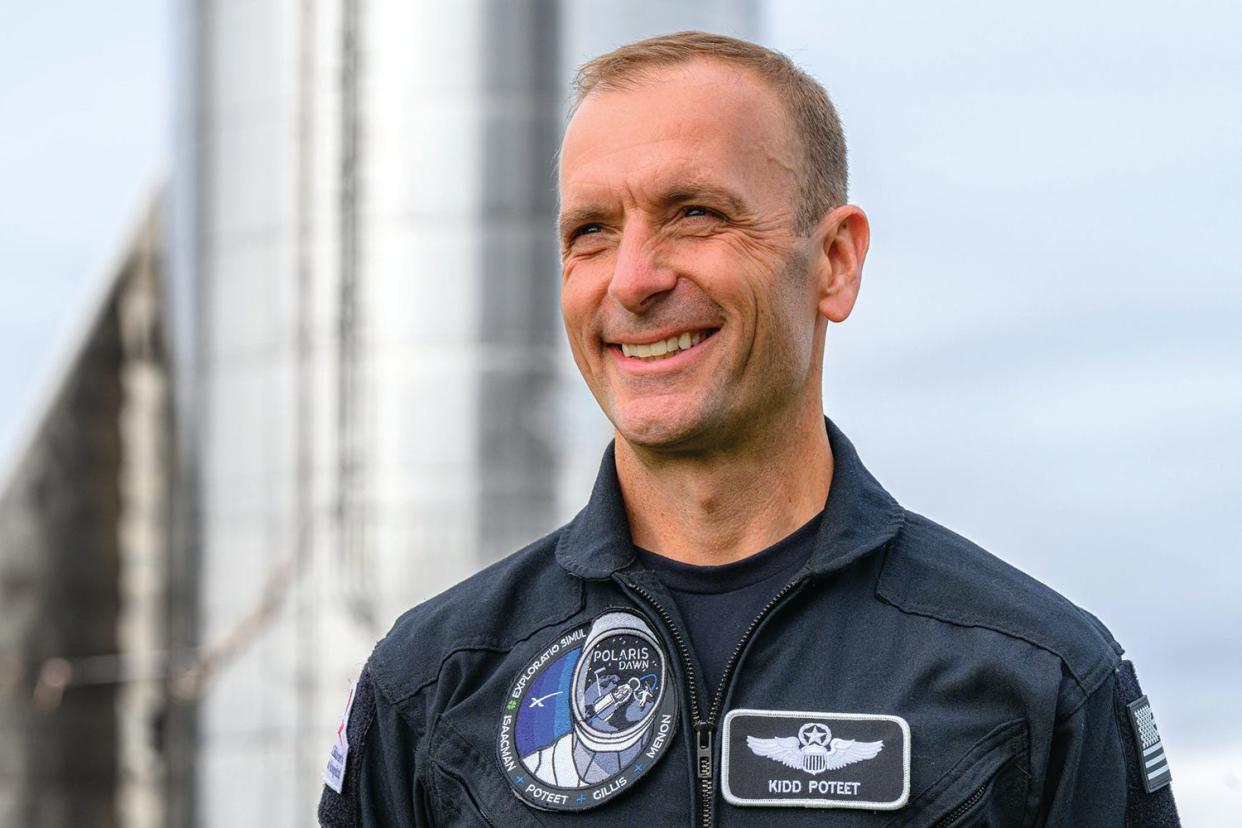Scott Poteet: Thunderbird Pilot & SpaceX Astronaut to speak in Kittery

- Oops!Something went wrong.Please try again later.
KITTERY, Maine — Thunderbird pilot, SpaceX astronaut and New Hampshire native Scott Poteet will give a talk on his experiences on Tuesday, April 4, at 7:30 p.m. at the Star Theatre in Kittery, Maine. The event will be “fireside chat” style with great visuals and frequent opportunities for audience interaction. The talk is a fundraiser for the Earth, Sea & Space Center project. There will also be a select silent auction of space-themed art.
A special reception will also be held on April 4, at Star Theatre from 6:30 to 7:15 p.m., with a limited number of tickets sold. Those attending the reception will enjoy dessert and a chance to have one on one time with Poteet. Tickets for the lecture only are $20 for adult and $10 for children under age 14. Tickets for the reception and lecture are $30 for adults and $15 for children under age 14. Tickets can be purchased online at www.earthseaspacemuseum.org or for lecture only, at the door as well.
Flying is as natural as breathing to (Retired) Lieutenant Colonel Poteet, who has been taking F-16 fighter jets to the skies since graduating from the University of New Hampshire in 1996. He has patrolled the Demilitarized Zone between North and South Korea, and flown combat missions over Bosnia, Kosovo and Iraq. In 2007 and 2008, he rocketed into the blue with the Thunderbirds, the Air Force’s elite precision team, executing breathtaking maneuvers in his supersonic Falcon while often flying only 18 inches apart from his teammates.
Now retired from the Air Force, Poteet has his eyes fixed on an even broader horizon—a trip to space. Poteet will serve as mission pilot for Polaris Dawn, guiding SpaceX’s Falcon 9 rocket closer to the moon than the United States has been since NASA’s Apollo missions of the 1970s. The mission is scheduled for this year.
Growing up in the 1980s, Poteet was inspired by movies such as “Top Gun” and “The Right Stuff” but he never thought he would add “astronaut” to his resume. “Being an astronaut is the pinnacle of the pyramid when it comes to flight,” he explains. “Historically, astronauts exemplify the best and brightest in physical, mental and technical achievement. NASA’s criteria is very strict and the standards are very high. However, few people can meet those standards. If we are to truly explore and understand space, we need more dedicated people up there. Private exploration opens the door for those who have skills in key areas to help gather critical information. I was surprised and honored to find a door opening for me. I am keenly aware that I am standing on the shoulders of all the astronauts who’ve gone before.”
The five-day Polaris Dawn mission is multi-faceted. The craft will try to reach the highest Earth orbit in the history of human space flight, reaching an initial apogee of 1,400 kilometers and breaking the Gemini 11 record. They will also touch the lower part of the Inner van Allen Belt, an area where astronauts haven’t been in 64 years. This area has concerned NASA space scientists because of possible significant radiation exposure. However, going through the Belts is the shortest route to the moon, so information about this region is key. Polaris Dawn will skim along the edge and the crew will receive about as much radiation as through a total body CT scan, according to Poteet. Nonetheless, radiation levels and impacts will be monitored for further study. The crew will also perform the first commercial space walk or EVA (Extravehicular activity) and the first using SpaceX suits.
A major part of Polaris Dawn’s five-day mission focuses on medical science and research that will help scientists better understand the challenges of long-term space flight and the effects of both radiation and micro-gravity on the human body.
The Polaris Dawn mission will also test SpaceX’s new StarLink laser communications system. These inter-satellite laser links will reduce the need for ground-based satellite connections and will be essential as astronauts go further and further from Earth.
The Polaris Dawn mission has a strong philanthropic component, thanks to its partnership with St. Jude’s Children’s Research Hospital, the world’s premier pediatric cancer treatment center. The Inspiration4 flight raised more than $240 million for St. Jude, and the medical research conducted on Polaris Dawn will directly benefit St. Jude’s efforts.
Come meet a local hero and learn about his amazing experiences while supporting a good cause. The Earth, Sea & Space Center project will bring a state-of-the-art science center to the Seacoast, as it locates in Dover, N.H. To learn more about the project, visit www.earthseaspacemuseum.org or call 603-436-7778. To buy tickets, visit the website.
This article originally appeared on Portsmouth Herald: Scott Poteet: Thunderbird Pilot & SpaceX Astronaut to speak in Kittery

